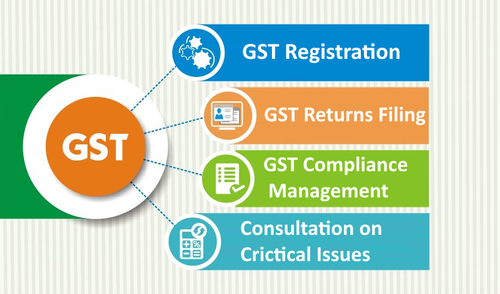Stay Clear Of Usual Blunders in Singapore GST Registration for Your Organization
Stay Clear Of Usual Blunders in Singapore GST Registration for Your Organization
Blog Article
The Ultimate Overview to Streamlining the GST Enrollment Refine and Needs for Small Business Owners

Recognizing GST Basics
To grasp the fundamentals of the Item and Solutions Tax Obligation (GST) system, small service proprietors should first recognize its underlying implications and concepts. GST is a value-added tax obligation imposed on most goods and services for domestic consumption. It aims to streamline the taxation process by changing multiple indirect taxes imposed by the state and main governments. Under the GST regime, companies are called for to sign up and collect tax in support of the government, making sure openness and conformity.
One of the vital principles of GST is input tax credit rating, which enables services to assert debt for tax obligations paid on their purchases. This mechanism avoids the cascading impact of taxes and advertises effectiveness in the tax system. In addition, GST is a destination-based tax, meaning that the tax is imposed at the point of intake instead of the point of beginning. This ensures fair distribution of tax obligation income amongst states based on where the goods or services are consumed. Comprehending these standard principles is crucial for tiny business proprietors to browse the intricacies of the GST system and make certain compliance with the regulation.
Eligibility Standards for Registration
Having actually developed a foundational understanding of GST principles, small company proprietors must now fulfill particular eligibility criteria to continue with the registration process. In India, entities took part in the supply of items or solutions with a yearly aggregate turnover exceeding Rs. 40 lakhs (Rs. 10 lakhs for special classification states) are needed to register for GST. In addition, specific organizations such as those involved in inter-state supply of items, casual taxed individuals, and those needed to pay tax obligation under the reverse charge mechanism have to sign up for GST irrespective of their turnover. Businesses that were signed up under the previous tax regime (VAT, solution tax obligation, etc) are also mandated to sign up under GST. Nevertheless, agricultural businesses that just supply generate out of main production are excluded from GST registration. It is critical for organization proprietors to meticulously examine their eligibility based upon these criteria to make certain compliance with the regulation and stay clear of any type of penalties for non-compliance.
Records Required for GST Registration

Simplified Registration Refine Actions
Adhering to the collection and confirmation of the requisite files, the enrollment procedure for GST can be navigated via a collection of simplified steps designed to promote effective compliance for small company owners. The initial step involves visiting the GST site and picking the 'New Enrollment' choice. Ultimately, the applicant must complete Component A of the GST REG-01 form with information such as PAN, mobile number, and e-mail address to acquire an OTP for confirmation. When the OTP is obtained and entered, a Short-term Reference Number (TRN) is produced for further procedures. The following step calls for filling out Component B of the type with essential service information, submitting sustaining documents, and finishing the confirmation procedure utilizing DSC or EVC. Upon successful verification, an Application Referral Number (ARN) is issued, suggesting the conclusion of the GST enrollment process. By complying with these simplified steps, tiny business owners can properly register for GST and guarantee conformity with tax obligation regulations.
Tips for Ensuring Conformity
To keep governing adherence and functional honesty, thorough oversight and positive steps are pivotal in guaranteeing conformity with GST requirements for tiny service proprietors. Small organization proprietors need to stay upgraded with GST guidelines, filing due dates, and any type of changes in tax obligation rates to avoid fines and preserve a good standing with tax obligation authorities. One important suggestion for his comment is here conformity is to keep accurate and thorough documents of all transactions, consisting of invoices, expenditures, and receipts associated to GST. On a regular basis fixing up economic documents with GST returns can help in recognizing and correcting any kind of discrepancies immediately. Additionally, performing periodic internal audits or looking for specialist support can make certain that the company is adhering to all GST rules properly. It is additionally important for little service proprietors to invest in GST-compliant accountancy software that can simplify read this post here the tax declaring process and decrease errors. Going to GST recognition workshops or training programs can boost understanding and compliance with GST regulations, eventually benefiting the service in the lengthy run.
Conclusion
Finally, small company proprietors need to recognize the fundamentals of GST, satisfy the eligibility criteria, gather required documents, and adhere to the simplified registration process actions to make certain conformity. By simplifying the GST enrollment procedure and demands, small company owners can stay clear of fines and operate their companies smoothly within the legal framework - Singapore GST Registration. It is essential for tiny service owners to remain educated and compliant with GST guidelines to maintain an effective company operation
Little business proprietors seeking GST enrollment should guarantee they collect and submit the required files to complete the registration process efficiently. The files required for GST enrollment normally include evidence of business enrollment or incorporation, FRYING PAN (Long-term Account Number) card of the service identification, entity and address proof of the promoters/partners/directors, pictures, address proof of the location of service, bank account declarations or terminated cheques, and my company authorization types. Participating in GST awareness workshops or training programs can improve understanding and conformity with GST policies, eventually profiting the company in the lengthy run.
By streamlining the GST registration process and demands, tiny business owners can prevent fines and operate their companies efficiently within the lawful structure. It is essential for little organization proprietors to stay informed and compliant with GST regulations to maintain a successful company operation.
Report this page